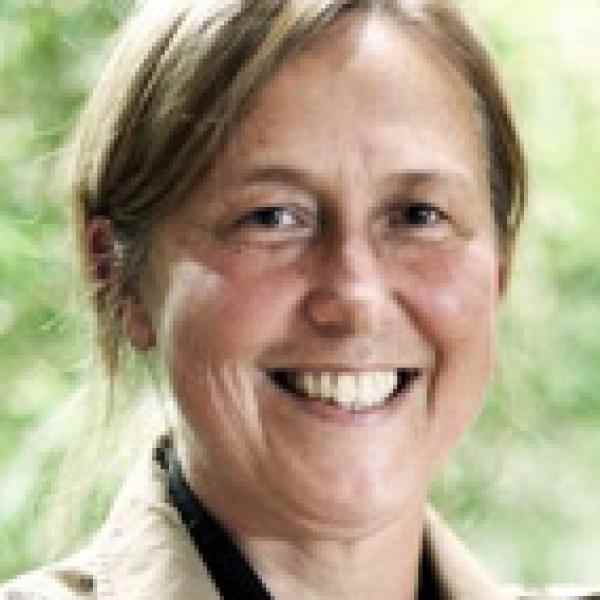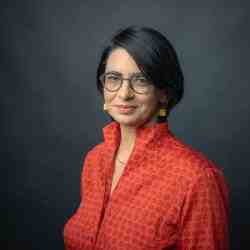Introduction
Katarzyna Winkowska-Nowak improves the quality of the education system by engaging teachers and local communities in an online and offline self-empowering community of shared practice in the fields of math and science. Katarzyna uses a combination of information communication technologies (ICT) and offline interaction to equip teachers with new teaching tools, encourage interaction, and illustrate to the community the collaborative effort necessary to educate young people. She is now expanding her model to impact other social issues, such as alcoholism, and broadening her geographic reach across Europe.
The New Idea
Katarzyna unlocks rural teacher’s potential to become inspiring forces in their communities through creating a trust-based and values-driven online community of teachers. Key to this strategy is a core group of selected teachers who together problem-solve and experiment with new teaching methods to share with the broader community of teachers. This broader network of teachers can then access and apply these best practices in their own work with students at their schools and in their communities. The core group also acts as the “laboratory” for testing and innovating new solutions to be shared with the wider physical communities of teachers gathered in Regional Centers for E-learning Education (ROSE) groups in remote rural areas throughout Poland.
This trust-based community emboldens teachers to implement new ideas and experiment with new technologies in the classroom. Katarzyna mobilizes teachers to take advantage of innovative digital technologies (e.g. GeoGebra) and open source technologies (e.g. Moodle and Google) in their educational work and community-based activities as well. These tools encourage active student involvement and co-creation in classroom activities, which helps to combat teachers’ helplessness and students’ lack of motivation.
Through this process, Katarzyna is changing attitudes among teachers and encouraging the spread of their ideas for innovation. Joining ICT solutions with a series of offline activities to engage students, teachers, and community members addresses the frustrations, indifference, and low self-esteem of teachers. Katarzyna is already addressing other critical social problems with this method, such as alcoholism and community development programs. Improving alcoholism and community development also require empowerment of individuals to combat ineffectiveness and sharing solutions collaboratively to address challenges.
The Problem
The results of 2011 final exams in Polish high schools illustrate the disinterest in scientific subjects, such as mathematics. In 2011, 21 percent of students failed their mathematics exams. These results prevail in education systems across Europe, although particularly in Poland. Teachers do not feel empowered to share knowledge with students in interesting or engaging ways and are often frustrated by the social pressures of the profession. For example, even though nearly every household in Poland owns a computer, teachers rarely use computers in the classroom. Teachers’ computer illiteracy affects their personal lives, but also their professional, because students’ assert inappropriate control in the classroom due to their increased technological knowledge. While urban schools are bombarded with ideas and initiatives for improvement, to a point at which they struggle to respond, small towns struggle the most: Rural schools remain disconnected from large cities and thus focus only on their own schoolyard.
Both teachers and students face individual and community challenges due to the current education system and the social pressures that result. On one hand, students and parents criticize teachers for their poor in-classroom success, which is seen as incompetency. On the other hand, educational authorities expect impressive test results during final exams and judge teachers on these figures. This dynamic and pressure for high test results leads to decreased motivation for students to study because they see it as irrelevant to their future career paths. For teachers, this high-pressure environment affects their ability to teach creatively on a broad scale, which also then limits their cooperation and sharing of ideas and solutions. In addition, teachers inherit the inability to self-learn whether in traditional ways or through using new technologies, although the latter is more of a social problem than one of access to technology. This teacher frustration and low self-esteem is rooted in the overall education system and outdated attitudes of learned helplessness, rather than entrepreneurship and willingness to innovate.
Polish society is in urgent need to change the perceptions of teachers in order to equip them with the tools to discover their own potential and their students’ abilities to learn and inspire change. Teachers who do not take advantage of their experience become frustrated and disengaged. This sentiment resonates with other professional groups who also feel that they are not able to serve their clients efficiently and effectively. The low level of cooperation among various groups of professionals, business and social organizations, a prevalent characteristic of Polish society, further reinforces the challenges in the education system. Katarzyna sees the solution as showcasing best practices and empowering professionals to increase exposure to self-learning and self-exchange opportunities so that ideas can be co-created and implemented.
The Strategy
Katarzyna employs a three-fold strategy. Her first step has been to assemble a core group of thirty teachers to champion a culture of sharing. These teachers experiment, develop, and implement new teaching methodologies and ICT tool applications in addition to introducing new community and school-based initiatives. The second step of Katarzyna’s strategy is building a network of ROSE groups, which are regional online groups of teachers engaged in e-learning and community activities that are led by the core group of teachers. Katarzyna created the ROSE groups throughout Poland to keep teachers accountable to spreading their ideas and to assemble a strong and vibrant network on which to facilitate long-term changes in the education system. The final component builds an online “Cloud” to engage core teachers as well as hundreds of others across the country in the development and application of ICT tools.
The core group of thirty teachers, led by Katarzyna—which is known as the “laboratory”—is comprised of teachers from different cities in Poland, although mostly provincial and rural. This is a closed group of teachers with a limited number of members; Katarzyna plans to keep these core groups relatively small. These teachers experiment with and develop new educational tools to unlock teachers’ potential. Each teacher in the core group must satisfy a strict set of criteria that was developed by the group when Katarzyna’s program was launched in 2004. Teachers must be interested in cooperating with academia/universities, have a strong vested interest in improving their competencies as teachers, want to exchange ideas with other teachers, and have exceptional communication and interpersonal skills, enabling them to engage others in innovative, educational ways. They must also be committed to exploring new ways for employing IT tools to earn the respect of students and become more effective educators. The core teacher group works in virtual teams and is comprised of both university professors and school teachers. This dynamic helps them incorporate technical innovations like ICT tools and also theoretical discoveries from academia to build this self-supporting community. Through this structure, innovations are developed by the whole team and are disseminated through a range of online platforms and offline activities such as annual conferences and training programs in Warsaw, or through the network of ROSE groups.
The eleven ROSE groups, led by the core group of teachers, impact various remote areas across Poland. Each ROSE group selects 150 to 200 teachers, from different schools and communities. These teachers later spread their knowledge and ideas for new curricula in their own local schools, often reaching up to 3,600 students per teacher. Following the model of the core laboratory group of teachers, ROSE members communicate primarily through the Internet, creating virtual teams, and at the same time acting as teachers on a local level within their schools. In the rural community of Kowalew, 1,500 teachers and community members formed a ROSE group at a local primary school. The members of the group learned how to use Joomla! open source content management system, CMS. As a result, a number of the ROSE group members created an interactive web page for the local Center for People with Alcohol Problems. These community members and local students now serve as webmasters, content providers, and editors for the center. The online communication platforms used by the core teachers and the ROSE group’s members encourage and promote the usage of open source programs like Moodle or free software like Google tools. Katarzyna plans to use IT tools and online/offline communities of shared best practices to inspire teachers on a wider scale and open their eyes to their own innovative work potential.
The third pillar of Katarzyna’s strategy is building a Cloud or community of shared practices around specific subject matters. This community integrates teachers from the core laboratory, ROSE groups, and other interested teachers. One of the larger communities of shared practice is built around GeoGebra (dynamic mathematics software that offers both graphical and algebraic input), which brings together over 600 math teachers from across Poland. In 2008, Katarzyna opened the Regional Center for GeoGebra in Central Eastern Europe, which now serves as an exchange platform for teachers across borders facing similar challenges in other regions. In 2010, the first GeoGebra national gathering took place and led to the launch of seven local GeoGebra conferences, all engaging teachers and students to present their innovative math education models to their communities. Even though GeoGebra is an existing open source and widely available software, Katarzyna and her team have contextualized this software to make it relevant to rural students across Slovakia. She has already shared her approach with partnering organizations in Ukraine, which led to the creation of the Ukraininan GeoGebra Center.
Katarzyna is empowering practitioners and academics in virtual project working groups, creating opportunities for fast-paced idea exchange, and accelerating the development of new solutions. Katarzyna’s three-part strategy, which includes the core laboratory group of teachers, networks of empowered teachers and university professionals, and communities of shared practices built around ICT tools, can become a platform to be applied to other social issues as well. For example, based on her success in the educational sphere, the Government of Poland has asked Katarzyna to use this network to overhaul its approach to dealing with alcoholism in rural areas. Katarzyna’s strategy offers a community and a network on which to build solutions to other social problems where the solution is hindered by the lack of idea exchange and cooperation among various stakeholders. The team of teams approach that Katarzyna employs—a core group of professionals who are the key idea drivers, the ROSE groups, and the Cloud community of shared practice—offers a universal structure that can drive change in many sectors in the future.
The Person
Katarzyna spent more than a decade teaching computer science in universities in both Poland and Florida where she and her husband had joint appointments. These experiences moving back and forth between university systems taught her the importance of teachers’ self-education, co-learning, and ability to innovate in order to communicate their learnings effectively. She brought these tools of self-improvement and self-education back to Poland to inspire similar learning environments in Eastern Europe. This initial realization was sparked further in the early 1990s when Katarzyna observed how her professor, H.O. Peitgen, engaged teachers as equal partners in discovering many interesting practical applications for mathematics. When Katarzyna returned to Poland, she organized several workshops for teachers to share engaging methods for teaching abstract phenomena. She translated a book about fractals and received support from the Ministry of Education and a publishing house to publish it with an accompanying movie. To date, the book has gone through four editions. This book was only the beginning of her ideas to reform education on a massive scale.
Katarzyna has recognized that self-learning, via computers or other sources of new knowledge, only fails when teachers do not use these resources. It is less a problem of access to technology than of technological utilization. The education system needs teachers who are backed by a network of support and idea exchange. In 2004 Katarzyna came up with her idea for bringing teachers together through self-learning and self-empowerment built around a community that supports this idea.
Seeing the transformation of the teachers participating in pilot project in 2004 and their impact in the community, Katarzyna decided to take this issue as her mission and lead Polish teachers into the 21st century. Her aim is to make the education process relevant to rural schools and empower teachers and other professionals to be the engines of transformation in their fields. It was only after a few years of intensive work with teachers that Katarzyna realized her approach with communities can easily serve other groups of professionals to be well-connected and empowered to share their knowledge and learning.




